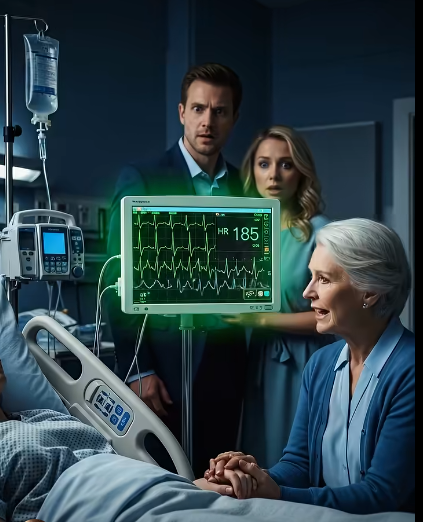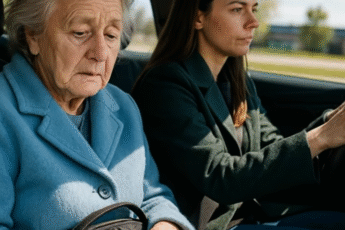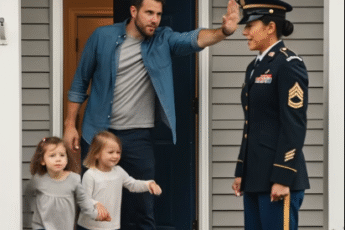The Intensive Care Unit was a world of steady, metronomic beeps and a silence so profound it felt heavy, a stillness where you could hear your own frantic heartbeat in your ears. I, Margaret, a 70-year-old widow, sat by the bedside of Emily, who was once my daughter-in-law and was still, in my heart, my daughter. She lay motionless amid a tangle of wires and tubes, her lovely face, normally so full of life, was now swollen and still. She looked like a discarded doll, a memory of the vibrant, laughing woman she once was.
My son, David, and his new wife, Vanessa, stood at the foot of the bed, performing a pantomime of grief so well-rehearsed it was nauseating.
“Mother, the doctors say there’s no hope,” David said, his voice flat, devoid of the genuine emotion a son should have. He sounded more like he was reading a business report than speaking of a person he once claimed to love. “They said her brain damage is too extensive. She’s never going to wake up.”
Vanessa, a woman with the delicate appearance of glass and the underlying hardness of steel, placed a deceptively comforting hand on his arm. “Look at her, Margaret,” she cooed, her voice sickly sweet. “Tethered to these machines… this isn’t living. It’s torture. Emily was so strong; she would never want this. Darling, we have to be strong for her.”
“She’s right, Mother,” David chimed in. “We should… we should let her go peacefully.”
Let her go. The words echoed in my head like a death sentence. They weren’t talking about mercy; they were talking about convenience. They were asking me, the mother who had loved Emily as her own, to bless the act. A cold dread washed over me, a chill that had nothing to do with the hospital’s air conditioning and everything to do with the evil standing before me.
“The doctor says it’s the humane thing to do,” David pressed, avoiding my eyes in a tell-tale sign of cowardice I knew all too well. “They said we can proceed as early as tomorrow. We just need the family’s consent.”
They were pushing. Their haste made my stomach clench.
I didn’t argue. Arguing with them now would be as futile as arguing with a hurricane. Instead, I chose my own path. “I need to sit with her,” I said, my voice hoarse with suppressed emotion. “Alone. Before we… decide anything. I need to say my own goodbye.”
Vanessa shot David a sharp look, a flicker of annoyance in her carefully calculated eyes, but she masked it quickly with a sympathetic smile. “Of course, Margaret. We’ll go get some coffee. Take all the time you need.”
My strategy: remove the predators so I could connect with the only person in the room who knew the truth. After they left, trailing their synthetic sorrow behind them, I pulled my chair closer, taking Emily’s limp, yet still warm, hand in mine.
“Emily, honey,” I whispered, my voice breaking. “It’s me. I’m here. Do you remember, when you first married David, how my husband, my old Navy pilot, taught us Morse code? Our ‘secret language,’ he called it. Do you remember? Just for us.” I stroked her hand with my thumb, praying for a flicker of memory to pierce the comatose fog. “He always said, ‘Language can save a life.’ I never thought it would matter so much.”
David and Vanessa’s fatal mistake was their arrogance. They assumed Emily was a blank slate, an empty vessel. They underestimated the bond between me and Emily, viewing our “secret language” as a harmless, sentimental relic, not a live communication channel, not a lifeline.
I remember a sunny afternoon years ago. My husband, a man whose eyes always crinkled with mischief, sat between me and Emily on the porch. “Listen up, girls,” he’d said, tapping my hand. “Three short, three long, three short. S-O-S. That’s how you call me in for dinner when I’m out in the garden.” We had laughed, and he’d spent the rest of the day teaching us the whole alphabet, making it our game, our code of affection.
Now, it was no longer a game.
The truth of the “accident” began to form in my mind, a horrifying mosaic. It was a fall down the stairs at Emily’s house. They said she’d tripped during a heated argument with David over finances. But I knew Emily. She was as graceful and sure-footed as a dancer. She would not have simply tripped. And I knew David’s temper when cornered – it was a volatile, vicious thing.
And then there was Vanessa. I remembered the first time David brought her home, shortly after his divorce from Emily. Vanessa had a smile that never reached her eyes. She always looked at Emily with a veiled jealousy and contempt, as if Emily’s very existence was a personal offense. I could picture it with painful clarity: Vanessa, her venomous jealousy always simmering beneath her innocent facade, “accidentally” putting a foot out in the heat of the moment. David, in his inherent cowardice, doing nothing, just watching his former wife fall. And then, the worst part: the delay in calling 911, a cold, calculated wait to ensure the brain damage would be severe enough to be deemed irreversible.
The motive wasn’t just hate. It was a ticking clock. Per their divorce settlement, Emily still held significant shares in a tech start-up she and David had co-founded in happier times. That start-up, after years of struggle, was about to be acquired by a tech giant in a multi-million-dollar deal. If Emily died before the deal closed in three weeks, her shares would default to David. If she survived, she would become a multi-millionaire in her own right. They weren’t just trying to “let her go peacefully”; they were trying to commit a time-sensitive murder for a massive financial payout.
I was whispering these memories and suspicions into Emily’s ear when I felt it. A twitch. Then another. Faint, but deliberate. Her index finger was tapping against my palm.
One long, one short. N.
— O.
- . – T.
A pause.
One short, one long. A.
A pause.
One short, one long. A.
-.-. C.
-.-. C.
.. I.
-.. D.
. E.
-. N.
- T.
N-O-T-A-N-A-C-C-I-D-E-N-T.
The cold shock was quickly replaced by a steely resolve. I needed proof, something they couldn’t dismiss, something a machine would record. I found the charge nurse, a woman named Rodriguez with kind but tired eyes.
“Nurse Rodriguez,” I said, keeping my voice calm and affecting a bit of grandmotherly bewilderment. “Forgive me for bothering you… I’m old, and maybe I’m seeing things. But I could have sworn I saw her eyelids flutter when I was speaking to her. It’s probably just the lights, or wishful thinking… But if it wouldn’t be too much trouble, could you please just monitor her vitals closely on the screen while I talk to her one more time? For my own peace of mind. My husband is gone, she’s all I have left.”
The vulnerability in my voice worked. She gave me the sympathetic look nurses reserve for grieving relatives. “Of course, ma’am. I’ll keep a close eye. Don’t you worry.”
The trap was set. I returned to the room, pleased to see David and Vanessa had returned, whispering in the corner like vultures. Their presence was exactly what I needed. I sat down, took Emily’s hand again, and spoke loudly, my voice ringing in the quiet room, every word a calculated piece of bait.
“Emily, honey, it’s me. I’m right here with you. Try to remember what happened on the stairs. I know you and David were arguing. Was he there? Was… Vanessa there?”
The moment I said Vanessa’s name, it happened.
Emily’s heart monitor, which had been beeping in a steady, metronomic rhythm, suddenly began to screech erratically, a frantic, piercing alarm. The green line on the screen, once a gentle wave, was now a frantic, panicked dance, a violent storm. At the same time, her brainwave monitor showed a dramatic spike in activity, a sharp peak of cognition and panic in a sea of stillness.
Vanessa saw the monitors and her composure shattered. Her face went white. “What are you doing?! Stop it! You’re hurting her!” she shrieked, lunging forward and trying to pull me from the chair in a move that was a pure admission of guilt.
“I’m just talking to her, Vanessa,” I said calmly, my eyes locked on the monitor.
“You’re tormenting her! The doctors said to let her rest! David, do something!” she hissed.
David, seeing the undeniable proof of consciousness on the screen, looked absolutely terrified. “Mom, that’s enough! You’re making things worse!” he stammered, his false bravado crumbling.
But it was too late. Nurse Rodriguez strode into the room, her eyes wide with clinical astonishment. “Ma’am, please step back,” she said firmly to Vanessa. “There’s a significant neurological response.” She quickly made a note on the chart, her eyes glued to the dancing numbers on the monitor. “I have to page the head of neurology immediately,” she announced, her voice now official. “Citing ‘unexpected patient responsiveness’.”
She hadn’t just seen it; she had officially charted it. The game had changed. Emily’s silence had finally spoken, and it had screamed.
The new neurological exam, conducted by a fresh team of doctors now on high alert, proved what I already knew: Emily was not in a persistent vegetative state. There was significant brain activity. She was trapped, a prisoner in her own body.
A formal investigation was launched. Detective Miller, a man with sharp, discerning eyes, interviewed me. “Mrs. Clark, your testimony about the Morse code was the breakthrough,” he said. “Frankly, we’d initially dismissed it as the wishful thinking of a grieving mother.”
“My husband taught us,” I replied. “He said language could be a weapon, or it could be a prayer. That day, it was both.”
The police re-examined the “accident” scene at Emily’s home. This time, they weren’t looking for a slip. They found scuff marks on the banister that matched David’s ring, a broken heel from one of Vanessa’s shoes wedged under the rug, and phone data that showed a 20-minute delay between the time of the fall and when the 911 call was made.
With my testimony about the coded message, the irrefutable proof from the hospital monitors, and the new findings at the scene, the police arrested David and Vanessa for attempted murder. The impending multi-million-dollar buyout provided the clear, damning motive, the final nail in their coffin.
Emily’s rebirth was a long, arduous road. But with the right care, and the truth now revealed, she began the journey back. I was by her side every day, reading to her, and tapping messages of love into her palm, our secret language now her tool for healing.
Two years later. Emily is out of the hospital. She is in a wheelchair in our real secret garden, the one my husband planted for me years ago. She is still in therapy, but she can speak, her words still hesitant but full of determination.
“I remember… I remember Vanessa’s voice,” she told me one afternoon, her eyes distant. “So much anger. And I remember David… just standing there.”
“You don’t have to remember anymore, my love,” I told her, squeezing her hand. “You’re safe now.”
And most importantly, she can smile again, a radiant smile that warms the entire garden.
“Margaret,” she says, her voice still a little weak but clear. “Thank you.”
I take her hand. It’s much stronger now. She looks me in the eye, and her fingers begin to move in my palm. Slowly, deliberately.
— M.
-.– Y.
A pause.
…. H.
. E.
.-. R.
— O.
M-Y H-E-R-O.
I squeeze her hand back, tears streaming down my face, but this time, they are tears of joy and relief. “He taught us well, my love,” I say.
The happy ending wasn’t revenge, but the triumph of our secret, loving language over a violent betrayal. It was the restoration of a life that was almost stolen, brought back from the brink of silence by a message from the heart, tapped into the palm of a hand.




